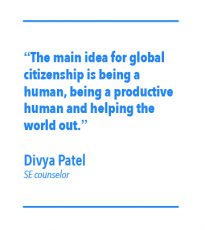| October 9, 2019 | Victor Allison | reporter |
|---|
To be a productive human being, citizens need to think beyond national borders, said SE counselor Divya Patel during an Oct. 2 workshop on SE Campus.
“The main idea for global citizenship is being a human,” said Patel. “Being a productive human and helping the world out.”
 Patel spoke to a crowd of nearly 80 in SE North Ballroom as part of a workshop series on global citizenship. The event was hosted by the SE Campus Advising and Counseling Center.
Patel spoke to a crowd of nearly 80 in SE North Ballroom as part of a workshop series on global citizenship. The event was hosted by the SE Campus Advising and Counseling Center.
Titled 60 Minutes Around the Globe, the workshop invited students and faculty to participate in roundtable discussions on issues ranging from global hunger to human trafficking. After the discussions concluded, participants shared their feelings.
The idea behind the workshop came from Patel and academic advisor Sheila Addo. As a response to the polarized political climate facing the country and the globe, the duo set out to create a platform that encourages this generation to reach across the aisle.
“It gives you the ability to communicate with people from different races, different regions, different backgrounds,” Addo said. “It also gives you the desire to want to fix what you think is wrong.”
Wednesday’s activities focused on the development of certain tools for global thinking, such as self-awareness, cultural empathy and cultivation of a broad worldview.
“Are you aware of your own personal biases or presumptions or assumptions about people who have different values than you?” Patel asked.
Both Patel and Addo emphasized the importance of tolerance, but the room’s willingness to be completely open-minded was put to the test during one exercise.
Following a news clip on human trafficking, attendees were asked if they could empathize with not only the victim of the crime, but the perpetrator as well.
After a delayed response, Patel stepped in.
“That’s the thing about empathizing with perpetrators,” she said. “I’m not saying agree or disagree, or saying what’s right or wrong. It’s just understanding the situation.”
During a discussion on global hunger, Addo said one of the most important things about thinking globally is to be aware that issues perceived as third-world problems are right in our backyards.
“Here in Texas, close to the border, we have a humanitarian crisis,” Addo said. “You do not have to go too far, within Southeast, this very campus, we do have that issue.”
SE student Leo Arroyo said the discussions were eye-opening.
“I learned that there are people with different views, different values and interpretations of things based on how they were raised, where they were from,” Arroyo said.

